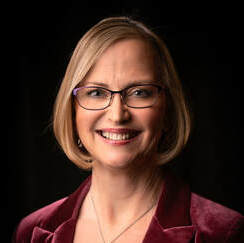Measurement-Based Care in Major Depressive Disorder
In this video, Saundra Jain, MA, PsyD, LPC, and Manish K. Jha, MBBS, speak about their session at Psych Congress 2022 titled “Measurement-Based Care in Depression and Beyond: What is it and how to make it work for your patients?” including the most commonly available measurement-based care tools clinicians utilize and how they can help clinicians who treat patients with major depressive disorder, depression, and bipolar disorder.
Additional Resource:
- Jain S, Jha MK. Measurement-based care: what is it and how to make it work for your patients. Talk presented at: Psych Congress 2022; September 17-20, 2022. New Orleans, LA. Accessed September 27, 2022. https://www.national.psychcongress.com/
For more conference coverage from Psych Congress 2022, visit the Excellence Forum.
Read more about this session from Psych Congress 2022 here.

Saundra Jain, MA, PsyD, LPC, is a psychotherapist, an adjunct clinical affiliate at The University of Texas at Austin School of Nursing, and a co-founder of the WILD 5 Wellness Program (Austin, TX).

Manish K. Jha, MBBS, is a psychiatrist and an assistant professor of psychiatry at UT Southwestern Medical Center (Dallas, TX).
TRANSCRIPTION:
Dr Saundra Jain: Hi. My name is Dr Saundra Jain, and I'm an adjunct clinical affiliate at the University of Texas in Austin with their School of Nursing, and I also have a private practice in Austin, Texas.
Manish Jha: Hi. I'm Manish Jha. I'm an assistant professor of psychiatry and an O'Donnell clinical neuroscience scholar at UT Southwestern, and I practice as a psychiatrist at the medical school too.
So, Saundra, I really also want to tell you about the measurement-based care practice, and even within my own practice, how I adapt it based on a person's case.
So, I would often start with a wide variety of measures. So measure screeners, as you mentioned, for depression, anxiety, ADHD, PTSD, and mood disorders, questionnaire for bipolar diagnosis, but then tailor it based on what I'm trying to target with my treatment. And then keeping in mind a global measure of wellbeing or activity impairment that I go with. So for depression, so everyone, every visit completes a nine-item patient health questionnaire. So that and the seven item, generalized anxiety disorder scale. So those two scales, everyone completes in my practice.
And then if they have PTSD, I also get the PCL-5. And if they have bipolar disorder, they also complete the scale for mania symptoms over time called the Ultimate Self Rating Mania Scale. So those are some of the scales that commonly get used in my clinical practice. If they have ADHD, I end up using the ASRS, so that we end up using those scales in at least our practice.
I also want to say that I would be remiss in pointing out a scale that has been developed by my mentor, Madhukar Trivedi, called the Concise Health Risk Tracking Scale, called CHRT. And I want to introduce that to the Psych Congress community because it's a measure of predicting suicidality. So suicidal ideation. So it not only measures a person's active suicidal ideation, but also the constructs that often are associated with suicidal ideation like hopelessness, despair or perceived lack of social support. So these again, like that again is like our health system does now use that scale also. So it's called CHRT and yeah, I mean because going back to your session with Dr Harkavy-Friedman, we cannot afford to miss out asking about this question.
Dr Saundra Jain: No, and as you were talking, I was thinking about Dr Jill's presentation. I'm also thinking that this is a great opportunity, Manish, to feature that scale through the Psych Congress network to really get the word out, make sure we include that the next time we do a presentation, make it available to Psych Congress family so they can start practicing and using it. I love what you said about how you start with a broader range and then you customize it, based upon what you want to follow.
One of the most common questions I get after doing a presentation, because I always say, here's my email. Write if you have questions or you can't find something, is okay, I can't do all of them. So what do you think is the best? And I mean, how can I tell somebody what the best is? I can say these are the most common, the best psychometric properties, but what you said I think, is worth stressing again, that depending upon what we want to follow and what we're really concerned about, that's how we shrink it down from a very broad group of scales. So I think that we just have to customize it based upon patient needs. Yeah, I like that.
The other thing that we talked about that I think probably is valuable to comment in this conversation is, we often, and I think clinicians are very familiar with PHQ-9, it is considered gold standard, but oftentimes they will not then have something to assess for bipolar disorder. And really having that conversation that look, most often when a patient comes into clinical practice, it's because they are in a depressive phase of the bipolar illness. And so what looks like depression may not always be major depressive disorder. So really, the stress to marry PHQ-9 or Beck Depression Inventory, whatever the clinician is using, don't leave out screening just for safety purposes for bipolar disorder.
Manish Jha: Whenever I talk about treatment-resistant depression, which is that after we have had a couple of adequate courses, trials and a person is not improving, one of the first differential to talk about is bipolar depression. So it is underdiagnosed. I think the longitudinal nature of relationship is also very important. So if ever in doubt, assess for mania, and also longitudinally as I've had individuals who worked with me, where they would send me their scores once a week. They had the pdf, they would just fill it out and email it to me. Sometimes they would just take a screenshot of their sticky note and email it to me, so that I know over time how they're doing. It leads to issues from a healthcare perspective because none of those activities are reimbursed care. So I don't want to say that we do this all. We have to demand as a community that those aspects also are provided for, so that we do good care, evidence-based care without relying too much on someone having to show up to a telehealth visit or come to an in-person visit.
Dr Saundra Jain: And that's the second most common question. Is there a code to get reimbursed for this? But I think you make a good point. We have to come together as a community and change the system, so that is considered important and worthy to be paid for.
Manish Jha: Absolutely.
Dr Saundra Jain: Easier said than done. I'm also thinking that it might be important in this chat to talk, because you talked about the new scale that Dr Trivedi has created and that you guys are using, and I'll take an opportunity when we talk about quality of life, functionality, and wellness. The HERO wellness scale is also now validated, available free of charge. Again, very simple, five questions on a Likert scale for measuring overall wellbeing, but specifically happiness, enthusiasm, resilience, optimism and overall wellbeing. So we may need to partner up and update our listing of scales and screeners to include some of these more recent scales and screeners to just really make it a richer place to visit.
Manish Jha: Yeah. And I do want to say that your HERO scale is a great scale, but also is amazing in shifting the narrative about these conversations, because so often in our medical framework we are just focusing on what is wrong, what is wrong, what is wrong. So that creates a negative bias towards our encounters by focusing on more positive aspects, what can we do to boost resilience? We may be creating more resilience. So I do really find that very helpful and very nice.
Dr Saundra Jain: Thank you, Manish. Ten years we've been researching wellness, but we were all teaching one-off on nutrition, mindfulness, a decade before that. But one of the things that I've learned in now having that conversation with patients is my wellness has improved, that it does change the conversation. It's not so illness symptom focused. Not that we're not going to do that, but it adds this richer sort of chapter, this other piece to the conversation, which at least for me, and I think for others, I think they would agree that it just elevates the entire experience in a really beautiful way.
Manish Jha: We need to do studies, including the HERO scale in our other studies, to see how it adds to that picture.
Dr Saundra Jain: Well, I'll take you up on that offer. It's a deal. I say we do it.
Manish Jha: Yeah.


